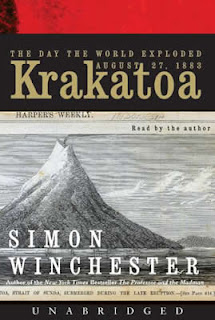I was given Simon Winchester's book Krakatoa for Christmas and anyone else who had the same present must have remarked on the coinicidence of the terrible tsunami in South-East Asia the following day.
As I read this book in early January, the news was full of the Tsunami, the magnificant response of ordinary people around the world and the contrastingly lack of concern from Bush and Blair.
It's impossible to seperate the stories of the tidal waves and earthquakes of 1883 with those of 2004 and the subsequant tragedies then and now have many similarities.
In 1883, the explosion of the Krakatoa volcano killed over 36,000 people. That the numbers of lifes lost was much smaller than last months is probably because that part of the world now has a larger population and the area is geared towards mass tourism in a way unimaginable in 1883.
The huge fault lines in the earth's crust where the two giant plates meet under the ocean are responsible for a number of volcanos, periodic tremors and quakes. In retrospect, Krakatoa's explosion was inevitable - but the science of 1883 could not have predicted it (which is why the effects of the huge explosion, and destruction of "six cubic miles of rock" in a instant was felt way beyond the immediate area). It is nothing short of criminal then that nobody thought to use the scientific understanding we have now in 2005 to prepare the people of South-East Asia for the something similar.
Simon Winchester is at his best when describing the science behind plate tectonics, volcanos and the consequences of the blast - both scientifically and in human terms. Personally though I found his discussion of the social consequences of the eruption less convincing - that Krakatoa helped create a mass radical Islamic, anti-western feeling in the area is possibly a step too far.
For anyone who wants to understand why natural disasters like Tsunamis occur and has an interest in the development of science and how it is part and parcel of economic and political development at the time, then this book is a great, simple introduction. For an analysis of the rise of Islamic fundamentalism and anti-colonial feeling in Asia you might want to look elsewhere, but don't let that small criticism mar what is a generally interesting read.

No comments:
Post a Comment